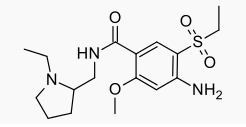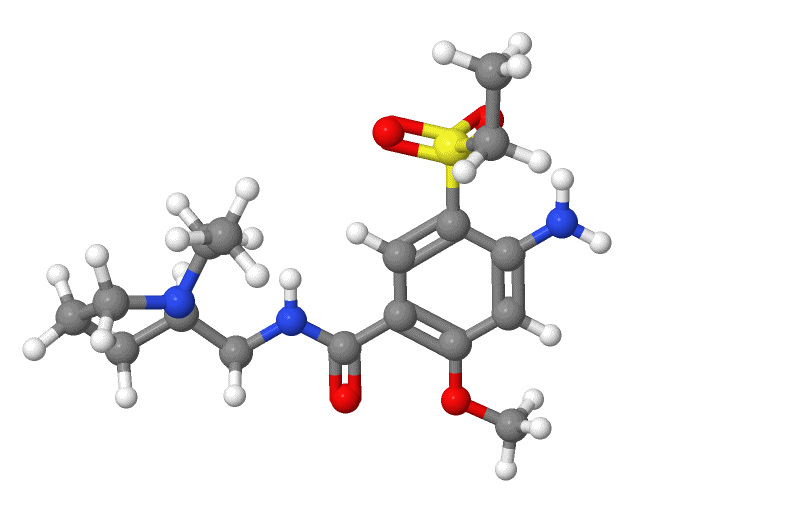Amisulpride
 | |
 | |
| Clinical data | |
|---|---|
| Pregnancy category |
|
| Routes of administration | Oral, intramuscular[1] |
| ATC code | |
| Legal status | |
| Legal status |
|
| Pharmacokinetic data | |
| Bioavailability | 48%[2] |
| Metabolism | ? |
| Elimination half-life | 12 h[2] |
| Excretion | Renal[2] |
| Identifiers | |
| |
| CAS Number | |
| PubChem CID | |
| DrugBank | |
| E number | {{#property:P628}} |
| ECHA InfoCard | {{#property:P2566}}Lua error in Module:EditAtWikidata at line 36: attempt to index field 'wikibase' (a nil value). |
| Chemical and physical data | |
| Formula | C17H27N3O4S |
| Molar mass | 369.48 g/mol |
Amisulpride (brand-name Solian) is an antipsychotic drug sold by Sanofi-Aventis. Amisulpride is a selective dopamine antagonist. It has a high affinity for D2 (Ki 2.8 nM) and D3 (Ki 3.2 nM) dopaminergic receptors. Its dosage ranges from 200 to 1200 mg/day. Lower doses (less than 50 mg) preferentially block d2 autoreceptors that control the synthesis and release of dopamine. This results in an increase in dopaminergic transmission. This dopamine increase is hypothesized to cause a reduction in both depressive and negative symptoms. Higher doses of the drug block the postsynaptic dopamine receptors resulting in an improvement in psychoses. Amisulpride is not approved by the Food and Drug Administration for use in the United States. Amisulpride (in 50mg doses) is marketed as a treatment for dysthymia in Italy (as Deniban) In one study, anxiety measured by HAM-A total mean score decreased significantly more with amisulpride 50mg/day (63%) than with fluoxetine 20mg/day (54%; P = 0.021).[3]
Side effects
Prolactin induction, nausea, weight gain, although much less than similar drugs in its class, and less commonly QT interval prolongation (which can lead to serious heart arrhythmias). Overdoses of amisulpride have been linked with torsades de pointes.[4]
See also
References
- ↑ 1.0 1.1 BIAM (2000) AMISULPRIDE, (HTML) Banque de Données Automatisée sur les Médicaments [online] Available from: http://www.biam2.org/www/Sub393.html Accessed on 25 November 2005. (French)
- ↑ 2.0 2.1 2.2 Rosenzweig P, Canal M, Patat A, Bergougnan L, Zieleniuk I, Bianchetti G. (2002). "A review of the pharmacokinetics, tolerability and pharmacodynamics of amisulpride in healthy volunteers". Human Psychopharmacology. 17 (1): 1–13. PMID 12404702.
- ↑ Smeraldi E (1998). "Amisulpride versus fluoxetine in patients with dysthymia or major depression in partial remission: a double-blind, comparative study". J Affect Disord. 48 (1): 47–56. PMID 9495601.
- ↑ Isbister G, Murray L, John S, Hackett L, Haider T, O'Mullane P, Gosselin S, Daly F (2006). "Amisulpride deliberate self-poisoning causing severe cardiac toxicity including QT prolongation and torsades de pointes". Med J Aust. 184 (7): 354–6. PMID 16584372. Free full text
- Pages with script errors
- CS1 maint: Multiple names: authors list
- Drugs with non-standard legal status
- E number from Wikidata
- ECHA InfoCard ID from Wikidata
- Chemical articles with unknown parameter in Infobox drug
- Articles without EBI source
- Chemical pages without ChemSpiderID
- Articles without KEGG source
- Articles without InChI source
- Articles without UNII source
- Articles containing unverified chemical infoboxes
- Atypical antipsychotics